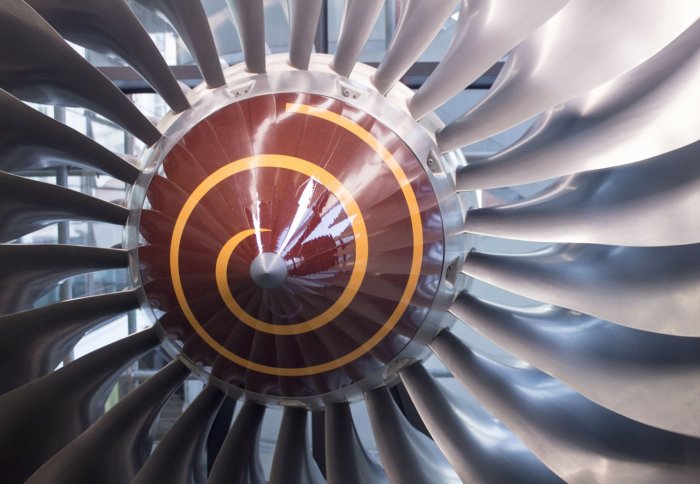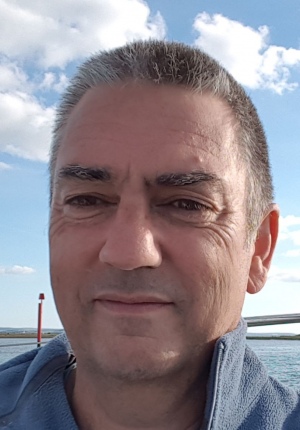Professor David Nowell joins Imperial to lead Vibration UTC

Rolls-Royce fan exhibited in the City& Guilds concourse at Imperial
Professor Nowell is the new director of the Rolls-Royce Vibration University Technology Centre based in the Department of Mechanical Engineering.
He is joining us from the University of Oxford, where he was one of the original academics involved in setting up the Rolls-Royce UTC in Solid Mechanics, and served as director of the UTC between 1999-2009.
What made you choose Imperial?
I reached that stage in a career where you begin to realise that you’re not going to work forever, and you start thinking about what you want to achieve in the rest of your career. Imperial brings the challenge of a new environment, and I think this is the right environment to do the work I want to do, particularly in the area of interfaces and friction, as well as structural integrity.
It was a good time personally as well because my youngest child’s gone off to University and my eldest child has just started a PhD in London, so I could spend more time in London and away from home. I’m excited by the opportunities here, I like being in an atmosphere where people are interacting and supporting each other. I’ve worked with Imperial people before, so it’s a place I know pretty well. The UTCs have just been awarded a large joint grant, I was on the Oxford side of that proposal, and now, of course, I’ve pitched up here at Imperial.
What are your goals in this new position?

Professor David Nowell
One goal is to get the UTCs at Imperial, Oxford and Nottingham working together more effectively with Rolls-Royce to build on the achievements of the past, but also to address the challenges of the future. I would also like to make some substantial technical progress, particularly in a couple of areas, one of which is understanding friction, and another being short fatigue cracks. There is currently a big push in engineering to simulate complex systems on the computer rather than carry out tests, and a lack of detailed understanding of friction is the largest uncertainty. Thirdly, I’d like to bring together the activity on structural performance and integrity, working with the people here. I think there’s a lot of good work going on here, but it’s not as well integrated as it might be. And finally, in ten years or so I’d like to pass on the UTC to somebody else in a better state than I’ve found it, with a very strong relationship with Rolls-Royce and with other relevant UTCs throughout the UK and elsewhere.
How would you explain your research area to a non-engineer?
Fundamentally, engineers want to make the world a better place.
– Professor David Nowell
I’m interested in Mechanical systems, primarily but not exclusively gas turbine engines, and in their structural performance and integrity. How do we make the structures so that they withstand the high temperatures and loads that they’re exposed to? How do we make sure that they’re safe, and that we’re not going to experience unexpected failures? But we also need to make them as light and as cheap as possible. It’s therein that lies the challenge, and that’s what I find fascinating- how do you achieve that? I suppose I’ve spent much of my career trying to put together the basic engineering understanding and applying it to those kinds of situations.
What motivates you in your work?
I think many mechanical engineers are fascinated by machines. At home, I love tinkering with things, and if something breaks, I like to take it apart and see if I can get it to work, and for me that’s the fundamental motivation of an engineer. That’s probably the reason why I’m an engineer and not a mathematician or a physicist: I like big engineering systems- small ones too, but big ones are great! Take an aircraft like the Airbus A380: what an amazing human achievement to design, manufacture and assemble it in a way that it operates as safely as it does, and it takes people around the globe! Fundamentally, engineers want to make the world a better place: to put in place technology that helps people achieve their goals and aims, and makes life more comfortable.
What do you find most rewarding about teaching?
What more satisfying thing can you do than interacting with intelligent, highly motivated young people? I think it’s a fantastic privilege. It keeps you young, because you’re constantly being challenged by their own perspectives on the world. It’s great when you can help someone who is struggling with a concept, and when you see them later you realise that they have made progress and you’ve won their understanding. Another thing that’s really nice is when former students get back in touch, and they want to tell you about their careers. A lot of people I’ve taught have gone off to do really exciting things, and if I’ve managed to help them a bit along that road, to achieve what they’re currently achieving, that’s very satisfying.
Article text (excluding photos or graphics) © Imperial College London.
Photos and graphics subject to third party copyright used with permission or © Imperial College London.
Reporter
Press Office
Communications and Public Affairs
- Email: press.office@imperial.ac.uk
